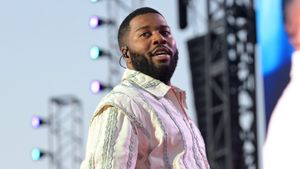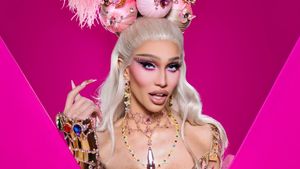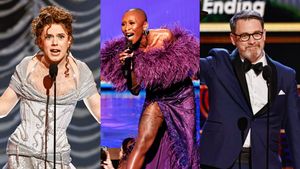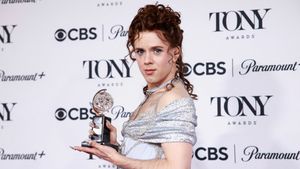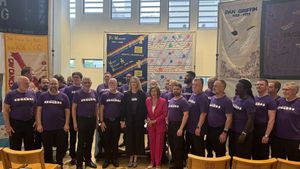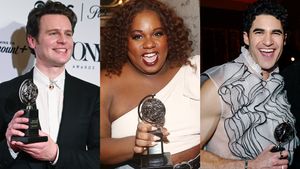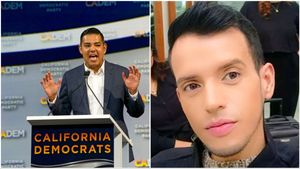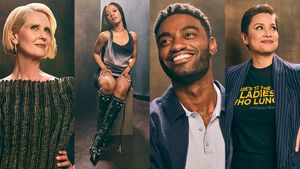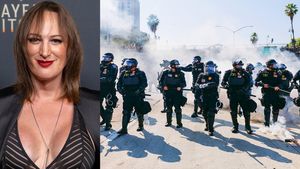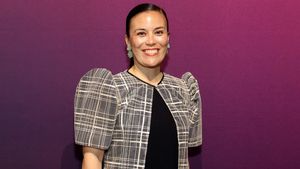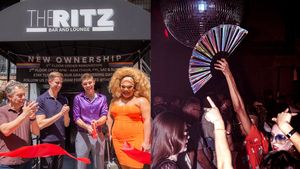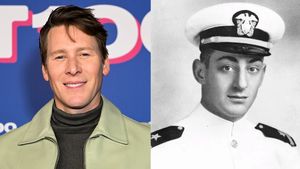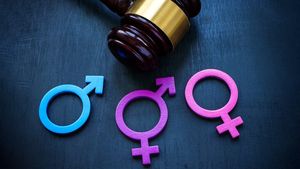Det. Olivia Benson is the longest running lesbian heart-throb and strong central female protagonist on prime-time TV. On Sept. 25, Law&Order: Special Victims Unit, the last remaining of the four-series Law & Order franchise created by Dick Wolf , began its 15th season. In the starring role is Mariska Hargitay, Hollywood royalty, daughter of actress Jayne Mansfield and actor/former- Mr. Universe Mickey Hargitay. (Mansfield was killed at the age of 34 in a terrible car accident when Hargitay was 3. Hargitay and her two brothers were in the back seat of the car, but sustained only minor injuries. The three adults in the front seat were killed.)
Early seasons of SVU have been in syndication for years on cable, so one can see the younger, leaner, softer and yet still butch-er Olivia as she learns the ropes as a female detective in a squad full of men. The Olivia of season 15 is both softer and harder. We see how her years at SVU have changed and challenged her.
We also see how the years Hargitay’s been on SVU have turned her into a sharper, keener, more nuanced actress with greater breadth than her early years on the show. This season she has given performances that have been nothing short of breathtaking.
It is in SVU’s first season that we learn Olivia chose the Special Victims Unit because she is herself the child of a rape. Her mother was raped as a young woman, gave birth to Olivia and has lived out her life as a trauma victim–drinking heavily, avoiding much, having a love/hate relationship with her daughter. The legacy of her conception has followed Olivia throughout her life.There is no other show on TV, either network or cable, that addresses the issues of rape, sexual assault, pedophilia, domestic violence, hate crimes against LGBT and often murder in every episode. That the show has continued with strong ratings throughout its extended run is in large part due to the strength of both writing and cast.
In 2006, Hargitay won an Emmy for Outstanding Lead Actress in a Drama Series, an award for which she’s been nominated every year between 2004 and 2011. She’s also won the Golden Globe Award and been nominated for the SAG Award and the Prism Award. There has never been a year since Hargitay has been playing Benson that she has not either been nominated for and/or won an acting award.
Olivia is the pivot of the police procedural elements in most episodes of SVU. Her inability to form lasting relationships outside her job, her issues with men–she’s presented as heterosexual, but her strength as well as her job seems to threaten the men she meets to whom she’s attracted–all add to the intensity with which she handles her work.
The job has not left Olivia unscathed. Season 14 ended with Olivia being kidnapped by a serial rapist/torture/murderer modeled on the BTK killer. Pablo Schreiber (Orange Is the New Black, Brooklyn Nine-Nine) was brilliant as William Lewis, the sadistic criminal fixated on Olivia.
In a three-episode arc–the season 14 cliffhanger and the two-part season 15 opener–Olivia is held hostage. She’s tortured and forced to watch as Lewis rapes another woman, the mother of his attorney. When Olivia finally is able to break free, she doesn’t leave. Instead she brutalizes Lewis–something she’s never done to a perpetrator before. That was always a problem for her long-time partner, Eliot Stabler (Chris Meloni, who left the show in 2011), who became so enraged by some perpetrators, particularly child abusers, that he would frequently take coercion several steps too far. Olivia was always attempting to dissuade him from being violent with perpetrators.
SVU walks many lines, all of them sharp, all of them edgy. Because of its subject matter, the show deals with the most gruesome aspects of human behavior. Sex crimes (the original title of the show, which the network decided was problematic) make audiences uncomfortable. Rape is a word no one wants to hear. Euphemisms for sexual assault abound. But SVU lays bare the harsh realities that go with the shocking numbers: one in five American women will be a victim of rape. According to the FBI/Department of Justice statistics, more than a quarter million women over 18 were raped last year, more than half by someone they knew.
What works best on SVU is the presentation of the brutality of sex crimes and the complicated nature of stigma that attaches to the victims as well as the perils of recovery. Olivia, as both the child of rape and a victim of near-rape in several different seasons, knows what victimology is. Yet her own father was a rapist.
By neither sugarcoating nor sentimentalizing the subject of rape and its variations, SVU addresses the least-talked about crime in America. Hargitay trained as a rape counselor in advance of working on the show so she would be able to bring verisimilitude to the role.
In 2004 she established the Joyful Heart Foundation to provide support to survivors of rape, sexual assault, domestic violence and child abuse. Hargitay said, "I started getting fan mail from survivors who felt a connection to Olivia. In many of these letters, people would disclose their personal stories of abuse, some for the very first time. I remember getting the sense that many were living in isolation with so much shame, but the shame belonged to the perpetrators. I wanted to help find a way to help people reclaim their lives and live them with a renewed sense of possibility and hope. And that’s what we work to do every day at Joyful Heart."
The letters Hargitay describes explain how vivid the show is for many viewers. As a rape victim myself, I have often felt the show gives a perspective on sexual assault that usually gets only lip-service on other drama series.
But SVU is not without its complications. While the show does indeed portray rape and other sex crimes in all their vivid, lurid, painful, despicable reality, it also exposes a core misogyny that complicates its message of not blaming and reclaiming victims.
In real life, the percentage of violent female criminals is small–less than five percent. But on SVU women are frequently either perpetrators or otherwise implicated in the crimes. Last week I watched an old episode from season two. The five-year statute of limitations is coming due on a serial rape case that’s grown cold. The team sets out to find the rapist before the end date.
But one of the victims has discovered the rapist first.
And she has decided to forgive him and allow him to have a fresh start in life. But the other victims whose lives have been destroyed by their rapes are desperate to have him arrested before the clock ticks out. These women confront the other in a painful, vicious scene, where they scream at her and one calls her a stupid bitch. Their anger and agony is palpable. It’s difficult to understand the third woman’s serene belief in her own righteousness in the face of so much pain.
The effect of this writing, however, is to attenuate the capture of the actual rapist, who turns out to be a paraplegic now, confined to a wheelchair. As he’s arrested in the last two minutes of the episode, we are left feeling rage toward one of the victims and empathy for the rapist.
This happens over and over throughout the series. The psychopathologies play out, but often the perpetrator is revealed as a victim, vitiating the actual victims’ experience. Women play major roles in the series, but they are implicated in the crimes almost as often as they are victims of them.
Meloni and Hargitay in the early days.
This season that psychodynamic has been ratcheted up by Olivia’s recent trauma. She’s seeing a therapist, but she’s come back to work too soon because she doesn’t want her attacker to "take that away" from her. But she sees perpetrators in victims, as a case similar to the Ohio case of the three women kept hostage for a decade crosses her path. We see a side of Olivia that is broken and seemingly damaged beyond repair as she blames one of the victims and treats her like a perpetrator. It takes a different woman detective, Amanda Rollins (Kelly Giddish) to explain how victimized the woman has been.
Classic SVU turn-the-woman-into-the-villain takes place in an early episode of this season. Cybill Shepherd guest-stars as a Paula Deen-esque character, Jolene Castille. After a series of brutal rape/assaults on the Upper East Side of older white women by a young black man in a hoodie, Castille is walking home and we see her approached by a man dressed similarly. He doesn’t stop when she asks him to and then we hear a shot, as Olivia and another detective are investigating a previous rape nearby.
The episode conflates the Paula Deen racism controversy with the George Zimmerman killing of Trayvon Martin. The man Castille shoots with her gun–she has a conceal-carry license–turns out to be a teenager, a very tall kid who looks more like a man than a boy. Other victims identify him from his photo, including one so brutalized she’s still in the hospital.
But when the boy dies, a sketchiness is revealed in Castille’s story–as well as a history of racism at the restaurant of the Georgia native. She’s no longer seen as a potential victim of a serial rapist defending herself, but as a vicious racist who killed a black teen in cold blood.
No.
Paula Deen used the n word in her past, like everyone who grew up in the South in her era, whether they are willing to acknowledge it or not. The lawsuit brought against her by a former employee, which is how this information was first revealed in a deposition, was dismissed. And most importantly, Deen didn’t murder Trayvon Martin.
But this is what SVU does all the time, makes the woman–in real life the overwhelming demographic of sex assault victims–into the perpetrator. Is it "sexier" in Hollywood-parlance, to present women as either perpetrators of or facilitators of violent, sex-related crimes? Is this a covert victim-blaming–making the woman somehow complicit in a crime against her or against another woman? Or is it simply the series depicting what most people still believe: rape is really a he said/she said issue.
(In one classic episode several seasons ago, viewers were presented with two sides of an alleged rape, that of a female graduate student and her professor known to be a philanderer. Did he rape her? Did she accuse him because of an affair gone sour? At the end of the episode the jury comes in and the viewers do not hear the verdict. We are left to decide for ourselves. Overwhelmingly viewers exonerated the man.)
This meme of woman-to-blame for the crime in question has repeated throughout all Dick Wolf’s Law & Order series–women only murder occasionally in real life, but they kill people with alarming facility on the other three series in the franchise. This trope is most problematic, however, on SVU because of the nature of the crimes and the vast majority of female victims.
And so viewers are left with a dilemma–watch for the accurate treatment of sex crimes and their impact, or boycott because of the underlying misogyny in the way the series plays out.
As the 15th season continues, the damage that’s been done to Olivia by her abduction will continue to impact her work and her personal life. (She’s finally in a seemingly solid relationship with another detective.) She will be the foil against which other victims’ trauma will play out.
What will be most compelling for the viewer will be what Olivia reveals to her therapist and to herself about what she did to Lewis after she handcuffed him to the bed. Will she be able to recapture the humanity she lost in that moment–albeit understandably–or will she slip further into the abyss as we witnessed in the one case where she attacked the victim?
We know Olivia saw parallels between herself and Castille prior to discovering Castille had lied about the shooting, because we’d seen Olivia beat a man who street harassed her just hours before that shooting. We know Olivia made a conscious decision to beat Lewis, because we saw her stop and then let her rage take over. And in that revelatory moment we also saw that SVU believes–or has the presentiment about–that women really will injure and/or kill men if given the opportunity of no one looking and no one judging.
Who Olivia turns out to be by the end of this season will be more than just a coda on the crime against her. It will also be a coda on where women stand within SVU the series and withSVU the metaphor for women and rape in the 21st century.
Victoria A. Brownworth is an award-winning journalist, editor and writer. She has won the NLGJA and the Society of Professional Journalists awards, as well as the Lambda Literary Award and has been nominated for the Pulitzer Prize. Her work has appeared in the New York Times, Baltimore Sun, Philadelphia Inquirer andThe Nation, among others. She is a regular contributor to The Advocate and SheWired, a blogger for Huffington Post and an contributing editor for Curve magazine and Lambda Literary Review. Her most recent book is From Where We Sit: Black Writers Write Black Youth, winner of the Moonbeam Award for Cultural/Historical Fiction 2012. Her novella, Ordinary Mayhem, won Honorable Mention in Best Horror 2012.
Like SheWired on Facebook
Follow SheWired on Twitter


















































